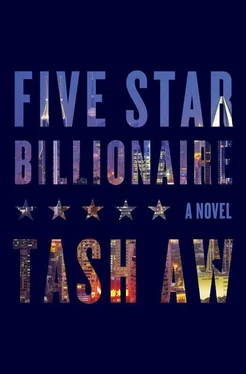He looked at his phone again. He had already added Yinghui’s number as a favorite contact, ready to be dialed whenever he wished. He had not known when that would be — a couple of weeks, a few months, a year? Perhaps never. He wondered if she had changed, wondered if he would be as tongue-tied with her as he had been nearly twenty years ago.
He stood up and went inside, waiting patiently for the slow, cigarette-smoke-filled lift to arrive. When he was back in his apartment, he made himself some green tea, which he drank with the last of the mochi snacks he had bought for Yanyan. He gazed at the view of the skyscrapers that had kept him company throughout the last nine months. It was true, he thought: Each one of them had its own personality, its own imprint of life. They were not at all alike, not what their perfunctory daytime selves suggested. And when he had finished his tea, he picked up the phone and began to dial Yinghui’s number, even though it was already very late in the night.

AS GARY TAKES THE STAGE FOR HIS SOLO SET, HE FEELS VERY calm, knowing that the four songs ahead of him will go well. Sometimes he just knows that a performance will go smoothly — that he will find his range and pitch from the first note and that his voice will be strong and clear, rising from his belly to his throat, velvety in texture. His nerves have been helped by the fact that he has already been onstage this evening, to sing a duet with Tsai Chin — they sang “Neverending Love,” one of the songs his mother used to sing to him, sometimes pretending that his mother was Tsai Chin. So for Gary it felt at once strange and touching that he should not only be singing a song with Tsai Chin but that she should be so maternal and protective of him. She had helped him get over the shock of being in front of a large audience once again, holding out her hand to him several times so that he would quite literally have something to hang on to. There had been an audible gasp when she beckoned to the wings and Gary appeared, walking unsteadily to join her in the middle of the stage. The audience was astounded to see him again after months of seclusion, and he knew that there was an element of shock involved in seeing him pale and thin, his hair shaved like a soldier’s. His voice, too, seemed richer and sadder than it once was; but it was indeed Gary, just as the posters had hastily announced.
Now, as he stands alone on the vast stage, staring out at the audience, he finds that he is still perfectly at home appearing in public. If he is calm, it is because he has no fear of his audience. He realizes that he had always been intimidated by his audience — not by the people but by what they expected of him. Every time he took to the stage, he felt the crushing weight of their demands — that he be beautiful, romantic, energetic, outstanding. But he no longer has a need to pretend; everyone has seen who he really is.
The darkened stadium is filled with people waving colorful fluorescent batons slowly above their heads as the music begins — the first strains of a song Gary has written himself. He sings in Minnan hua , the dialect of his mother, of his youth, an earthy, rustic language that some would call coarse. Maybe this is why it suits the song so well; maybe this is why it suits him so well, Gary thinks, for, after all, he is just a rough country boy. Maybe everything the papers said about him all those months ago is true. No one else in the audience can follow the words; no one sings along. Singing in his mother tongue reminds him of the quiet solitude of his childhood — of the long hours he spent sitting on the porch of his village house, watching the rain falling late in the afternoon, hoping it would end, though often it would last until nightfall, hastening the arrival of darkness. He feels, for the first time in a big concert, that he is alone in the auditorium, but it is a loneliness that feels calm, as it did many years ago, when he was still small. Only he can fully appreciate the quality of his voice filling his lungs, filling the vast space above him.
I am indebted to the following people and organizations, whose extraordinary kindness and generosity allowed me to live in Shanghai at various times during the writing of this novel: The Shanghai Writers’ Association, with special thanks to Wang Anyi and Hu Pei; everyone at the M Literary Residency, especially Michelle Garnaut, Tina Kanagaratnam, Bruno Van Der Burg, and Jane Chen; and the Society of Authors for the award of an Authors’ Foundation grant.
Of the many books I consulted while researching this novel, Leslie Chang’s groundbreaking study of migrant workers, Factory Girls , proved the most inspirational.
Ian Teh’s beautiful, disturbing photographs of both China and Malaysia were a starting point for many happy conversations about migration and the changes taking place in the countries we know and love.
I am also deeply grateful to friends and family who fed and supported me while I wrote this novel: Clare Allan, Tahmima Anam and Roland Lamb, Liling and James Arnold, David Godwin, Philip Goff, Sue-Ling and Alistair Griffin, Charlie Gurdon, Tony Hardy, Francis Hétroy, Huang Bei, DD Johnson, Michelle Kane, Marianna Kennedy and Charles Gledhill, Mimi and Aaron Kuo-Deemer, Alison MacDonald and Adam Thirlwell, Andrew Mills, Beatrice Monti Von Rezzori, Siddharth Shanghvi, Joo Teoh, Anna Watkins, You Sha and Jeff Weil, and Adele You Yun.
Thanks also to: Cindy Spiegel in New York; Nicholas Pearson and Robert Lacey in London; Maggie Doyle in Paris; and Kamloon Woo in Taipei.
TASH AW was born in Taipei, in the Republic of China, and brought up in Malaysia. He moved to England to attend university and now lives in London. He is the author of The Harmony Silk Factory , which was the winner of the Whitbread Award for First Novel and the Commonwealth Book Prize for best first novel and was longlisted for the Man Booker Prize, and Map of the Invisible World . His other awards include the inaugural M Literary fellowship in Shanghai and an O. Henry Award.
Конец ознакомительного отрывка
Купить книгу



![Scott O’Hara - Five-Star Fugitive [= Border Town Girl]](/books/432138/scott-o-hara-five-thumb.webp)









